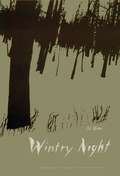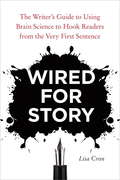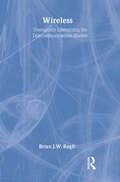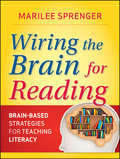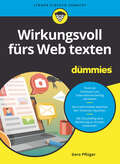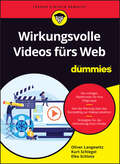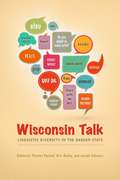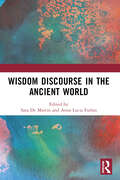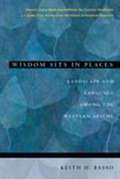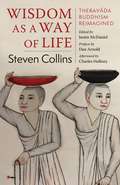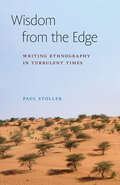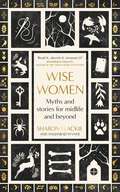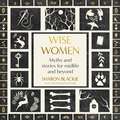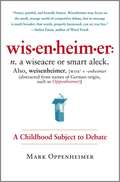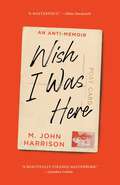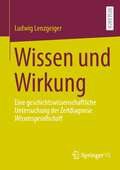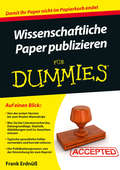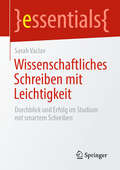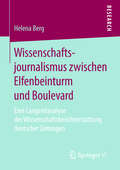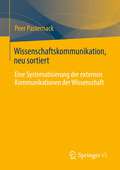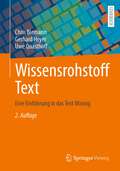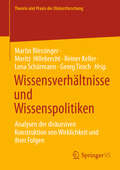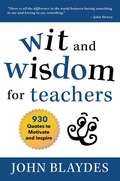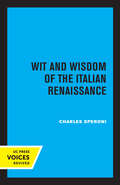- Table View
- List View
Wintry Night (Modern Chinese Literature from Taiwan)
by Qiao LiAn epic spanning more than half a century of Taiwan's history, this breathtaking historical novel traces the fortunes of the Pengs, a family of Hakka Chinese settlers, across three generations from the 1890s, just before Taiwan was ceded to Japan as a result of the Sino-Japanese war, through World War II. Li Qiao brilliantly re-creates the dramatic world of these pioneers—and the colonization of Taiwan itself—exploring their relationships with the aboriginal peoples of Taiwan and their struggle to establish their own ethnic and political identities.This carefully researched work of fiction draws upon Li's own experiences and family history, as well as oral and written histories of the era. Originally published in Chinese as a trilogy, this newly translated edition is an abridgement for English-speaking readers and marks the work's first appearance in the English-speaking world. It was well-received in Taiwan as an honest—and influential—recreation of Taiwan's history before the relocation of the Republic of China from the mainland to Taiwan.Because Li's saga is so deeply imbued with the unique culture and complex history of Taiwan, an introduction explaining the cultural and historical background of the novel is included to help orient the reader to this amazingly rich cultural context. This informative introduction and the sweeping saga of the novel itself together provide an important view of Taiwan's little known colonial experience.
Wired for Story
by Lisa CronThis guide reveals how writers can utilize cognitive storytelling strategies to craft stories that ignite readers' brains and captivate them through each plot element. Imagine knowing what the brain craves from every tale it encounters, what fuels the success of any great story, and what keeps readers transfixed. Wired for Story reveals these cognitive secrets--and it's a game-changer for anyone who has ever set pen to paper. The vast majority of writing advice focuses on "writing well" as if it were the same as telling a great story. This is exactly where many aspiring writers fail--they strive for beautiful metaphors, authentic dialogue, and interesting characters, losing sight of the one thing that every engaging story must do: ignite the brain's hardwired desire to learn what happens next. When writers tap into the evolutionary purpose of story and electrify our curiosity, it triggers a delicious dopamine rush that tells us to pay attention. Without it, even the most perfect prose won't hold anyone's interest. Backed by recent breakthroughs in neuroscience as well as examples from novels, screenplays, and short stories, Wired for Story offers a revolutionary look at story as the brain experiences it. Each chapter zeroes in on an aspect of the brain, its corresponding revelation about story, and the way to apply it to your storytelling right now.
Wired for Story
by Lisa CronThis guide reveals how writers can utilize cognitive storytelling strategies to craft stories that ignite readers' brains and captivate them through each plot element. Imagine knowing what the brain craves from every tale it encounters, what fuels the success of any great story, and what keeps readers transfixed. Wired for Story reveals these cognitive secrets--and it's a game-changer for anyone who has ever set pen to paper. The vast majority of writing advice focuses on "writing well" as if it were the same as telling a great story. This is exactly where many aspiring writers fail--they strive for beautiful metaphors, authentic dialogue, and interesting characters, losing sight of the one thing that every engaging story must do: ignite the brain's hardwired desire to learn what happens next. When writers tap into the evolutionary purpose of story and electrify our curiosity, it triggers a delicious dopamine rush that tells us to pay attention. Without it, even the most perfect prose won't hold anyone's interest. Backed by recent breakthroughs in neuroscience as well as examples from novels, screenplays, and short stories, Wired for Story offers a revolutionary look at story as the brain experiences it. Each chapter zeroes in on an aspect of the brain, its corresponding revelation about story, and the way to apply it to your storytelling right now.
Wireless: Strategically Liberalizing the Telecommunications Market (Lea Telecommunications Ser.)
by Brian J.W. RegliThe revolution of wireless communications has only just begun to transform the telecommunications industry worldwide. This book offers insight into the possible options for corporate strategists and government policymakers as they look to harness the expansion of wireless communications to meet the goals of sustainable telecommunications development. Using a multidisciplinary approach which combines policy research, legal analysis, business economics, and models of sustainability from the environmental sciences, the book compares the development of wireless communications in four countries: the United States, the United Kingdom, Russia, and Brazil. The comparative analysis points to common themes and opportunities, including: * breaking down the barriers between wireless and wireline access by changing the regulatory design which constrains service providers; * targeting the development potential of wireless access through the utilization of new technologies and service models; and * using wireless access as the basis for full facilities-based competition in both developing and developed world markets. No other book today offers this broad a context for a discussion of wireless communications and its potential impact on the evolution of the telecommunications industry.
Wiring the Brain for Reading
by Marilee B. SprengerUsing the latest neuroscience research to enhance literacy instruction Wiring the Brain for Reading introduces teachers to aspects of the brain's functions that are essential to language and reading development. Marilee Sprenger, a specialist in learning and the brain, provides practical, brain friendly, strategies for teaching essential skills like phonemic awareness, phonics, fluency, vocabulary, and comprehension. The author's innovative approach aligns well with the Common Core State Standards for English Language Arts and is designed to enhance students' motivation and excitement in reading.Offers a clear explanation of brain functioning in order to enhance language and reading instructionIncorporates proven literacy strategies, games, and activities as well as classroom examplesAligns with Common Core State Standards for learning to read, developing fluency, and interpreting complex textsWiring the Brain for Reading offers practical strategies for applying the latest research in neuroscience and learning to the classroom.
Wirkungsvoll fürs Web texten für Dummies (Für Dummies)
by Gero PflugerSie haben eine Website und möchten in Texten Informationen über Produkte oder Dienstleistungen liefern? Sie verkaufen übers Internet und brauchen knackige Produktbeschreibungen? Oder ist Ihr tägliches Brot das Schreiben von Online-Pressemitteilungen, E-Mail-Newslettern oder Social-Media-Beiträgen? Dieses Buch unterstützt Sie dabei, bessere Texte für Ihre Online-Auftritte zu produzieren, damit diese für Ihre Besucher und Follower relevanter werden. Lernen Sie Texten: Es ist gar nicht so schwer.
Wirkungsvolle Videos fürs Web für Dummies (Für Dummies)
by Oliver Langewitz Kurt Schlegel Elke SchloteMithilfe von Videos das Netz begeistern Videos bieten Ihnen die Möglichkeit, eigene Ideen zu vermitteln oder Ihre Marke zu präsentieren. Wie Sie wirkungsvolle Videos fürs Web erstellen und was Sie bei der videobasierten Kommunikation beachten müssen, erfahren Sie in diesem Buch. Oliver Langewitz, Kurt Schlegel und Elke Schlote erklären Ihnen in praktischen Schritten, wie Ihnen die Planung, Erstellung und Verbreitung von Videos fürs Web optimal gelingt. Dabei lernen Sie auch die Besonderheiten der verschiedenen Internetplattformen kennen und wie Sie Ihre Zielgruppe mit Ihren Inhalten abholen. Sie erfahren Wie Sie professionelle Webvideos produzieren Wie Sie in Ihren Videos wirksame Geschichten erzählen Welche Online-Kanäle für Ihre Videos wichtig sind Wie es Ihnen gelingt, mit Ihren Videos eine breite Community zu erreichen
Wisconsin Talk
by Thomas Purnell Eric Raimy Joseph SalmonsWisconsin is one of the most linguistically rich places in North America. It has the greatest diversity of American Indian languages east of the Mississippi, including Ojibwe and Menominee from the Algonquian language family, Ho-Chunk from the Siouan family, and Oneida from the Iroquoian family. French place names dot the states map. German, Norwegian, and Polish the languages of immigrants in the nineteenth and early twentieth centuries are still spoken by tens of thousands of people, and the influx of new immigrants speaking Spanish, Hmong, and Somali continues to enrich the states cultural landscape. These languages and others (Walloon, Cornish, Finnish, Czech, and more) have shaped the kinds of English spoken around the state. Within Wisconsins borders are found three different major dialects of American English, and despite the influences of mass media and popular culture, they are not merging they are dramatically diverging. An engaging survey for both general readers and language scholars, Wisconsin Talk brings together perspectives from linguistics, history, cultural studies, and geography to illuminate why language matters in our everyday lives. The authors highlight such topics as: words distinctive to the state how recent and earlier immigrants have negotiated cultural and linguistic challenges the diversity of bilingual speakers that enriches our communities how maps can convey the stories of language the relation of Wisconsins Indian languages to language loss worldwide.
Wisdom Discourse in the Ancient World
by Sara De Martin Anna Lucia FurlanThis book moves beyond the debate on ‘wisdom literature’, ongoing in biblical studies, to demonstrate the productivity of ‘wisdom’ as a literary category. Featuring work by scholars of Egyptology, classics, biblical and Near Eastern studies, it offers fresh perspectives on what makes a text ‘wisdom’.This interdisciplinary volume widens the scope of the investigation into ‘wisdom literature’, chronologically, geographically, and methodologically. Readers are given insights into how the label ‘wisdom’ contributes to our understanding of diverse literary forms across time periods and cultural contexts. In the volume’s introduction, the editors consider ‘wisdom’ as a ‘discourse’, shifting the focus from the debate on whether ‘wisdom literature’ is a genre to the properties of the texts, namely exploring what makes a text ‘wisdom’. This offers a methodological backdrop against which the diverse approaches of the single authors productively coexist. The chapters examine texts that are the products of different ancient cultures, with several of them bridging diverse cultural, social, and chronological contexts. By sampling how different methodologies interact both within individual interpretative efforts and in wider attempts to understand cross-cultural literary phenomena, this volume also contributes new perspectives to the scholarship on ancient literary genres.Wisdom Discourse in the Ancient World will interest both students and scholars of the ancient Near East, Egyptology, classical studies, biblical studies, and theology and religious studies, particularly those working on wisdom literature in antiquity. It will also appeal to readers with an interest in comparative approaches and genre studies more broadly.
Wisdom Sits In Places: Landscapes and Language Among the Western Apache
by Keith H. BassoFour essays recount stories Western Apaches tell about the landscape. Includes comments from a cultural anthropologist.
Wisdom as a Way of Life: Theravāda Buddhism Reimagined
by Steven CollinsThis wide-ranging and powerful book argues that Theravāda Buddhism provides ways of thinking about the self that can reinvigorate the humanities and offer broader insights into how to learn and how to act. Steven Collins argues that Buddhist philosophy should be approached in the spirit of its historical teachers and visionaries, who saw themselves not as preservers of an archaic body of rules but as part of a timeless effort to understand what it means to lead a worthy life. He contends that Buddhism should be studied philosophically, literarily, and ethically using its own vocabulary and rhetorical tools. Approached in this manner, Buddhist notions of the self help us rethink contemporary ideas of self-care and the promotion of human flourishing.Collins details the insights of Buddhist texts and practices that promote the ideal of active and engaged learning, offering an expansive and lyrical reflection on Theravāda approaches to meditation, asceticism, and physical training. He explores views of monastic life and contemplative practices as complementing and reinforcing textual learning, and argues that the Buddhist tenet that the study of philosophy and ethics involves both rigorous reading and an ascetic lifestyle has striking resonance with modern and postmodern ideas. A bold reappraisal of the history of Buddhist literature and practice, Wisdom as a Way of Life offers students and scholars across the disciplines a nuanced understanding of the significance of Buddhist ways of knowing for the world today.
Wisdom from the Edge: Writing Ethnography in Turbulent Times (Expertise: Cultures and Technologies of Knowledge)
by Paul StollerWisdom From the Edge describes what anthropologists can do to contribute to the social and cultural changes that shape a social future of wellbeing and viability. Paul Stoller shows how anthropologists can develop sensuously described ethnographic narratives to communicate powerfully their insights to a wide range of audiences. These insights are filled with wisdom about how respect for nature is central to the future of humankind. Stoller demonstrates how the ethnographic evocation of space and place, the honing of dialogue, and the crafting of character depict the drama of social life, and borrows techniques from film, poetry, and fiction to expand the appeal of anthropological knowledge and heighten its ability to connect the public to the idiosyncrasies of people and locale. Ultimately, Wisdom from the Edge underscores the importance of recognizing and applying indigenous wisdom to the social problems that threaten the future.
Wise Women: Myths and stories for midlife and beyond
by Sharon Blackie Angharad WynneAn unforgettable collection of retold myths and folk tales celebrating the wisdom and power of women in midlife and beyond, from the award-winning author of Hagitude'An extraordinary selection of stories ... beautifully and vividly retold' TLS'Read it, absorb it, treasure it!' SHAHRUKH HUSAIN, author of The Virago Book of Witches'A fascinating collection of female myths and legends' SARA SHERIDAN, author of The Fair BotanistsFrom early childhood, we learn about the world and its possibilities through myths and fairy tales. The heroines, though, tend to be golden-haired princesses, and the evil-doers often older women. But women today are searching for positive versions of themselves from midlife onwards, and this dazzling array of not-to-be-messed-with characters - from ungainly giantesses and sequin-strewn fairy godmothers to misunderstood witches and craggy crones - provides them. They outwit monsters, test and mentor younger heroines, embody the cycles and seasons of the earth, weave the world into being - and almost always have the last laugh.These women manifest their wisdom in different ways, and so offer us inspiration for how we too can walk boldly and live authentically in the second half of life.'Wonderful, both comforting and inspiring' VICTORIA SMITH, author of Hags'The book I've been longing for' JILL DAWSON, author of The Bewitching'I adored Wise Women - this is the missing piece of the jigsaw puzzle when it comes to reframing the narrative in our culture about the role of older females' ELEANOR MILLS, author of Much More to Come: Lessons on the mayhem and magnificence of midlife 'Reading it quenched a thirst I didn't know I had. Oh for a world where stories of the power and joy of women's elder years are celebrated everywhere' DOREEN CUNNINGHAM, author of Soundings'Revisits our old stories, making them thrilling for us now' STELLA DUFFY OBE
Wise Women: Myths and stories for midlife and beyond - 'Extraordinary ... beautifully and vividly retold stories' TLS
by Sharon Blackie Angharad WynneAn unforgettable collection of retold myths and folk tales celebrating the wisdom and power of women in midlife and beyond, from the award-winning author of Hagitude'An extraordinary selection of stories ... beautifully and vividly retold' TLS'Read it, absorb it, treasure it!' SHAHRUKH HUSAIN, author of The Virago Book of Witches'A fascinating collection of female myths and legends' SARA SHERIDAN, author of The Fair BotanistsFrom early childhood, we learn about the world and its possibilities through myths and fairy tales. The heroines, though, tend to be golden-haired princesses, and the evil-doers often older women. But women today are searching for positive versions of themselves from midlife onwards, and this dazzling array of not-to-be-messed-with characters - from ungainly giantesses and sequin-strewn fairy godmothers to misunderstood witches and craggy crones - provides them. They outwit monsters, test and mentor younger heroines, embody the cycles and seasons of the earth, weave the world into being - and almost always have the last laugh.These women manifest their wisdom in different ways, and so offer us inspiration for how we too can walk boldly and live authentically in the second half of life.'Wonderful, both comforting and inspiring' VICTORIA SMITH, author of Hags'The book I've been longing for' JILL DAWSON, author of The Bewitching'I adored Wise Women - this is the missing piece of the jigsaw puzzle when it comes to reframing the narrative in our culture about the role of older females' ELEANOR MILLS, author of Much More to Come: Lessons on the mayhem and magnificence of midlife 'Reading it quenched a thirst I didn't know I had. Oh for a world where stories of the power and joy of women's elder years are celebrated everywhere' DOREEN CUNNINGHAM, author of Soundings'Revisits our old stories, making them thrilling for us now' STELLA DUFFY OBE
Wisenheimer: A Childhood Subject to Debate
by Mark OppenheimerHave you ever met a child who talked like an adult? Who knew big words and how to use them? Was he a charmer or an insufferable smart aleck--or maybe both? Mark Oppenheimer was just such a boy, his talent for language a curse as much as a blessing. But when he got to junior high, Oppenheimer discovered an outlet for his loquaciousness: the debate team. Frank and comical, Wisenheimer chronicles the travails of a hyperarticulate child who finds salvation in the heady world of competitive oratory. In stirring prose, Oppenheimer describes what it was like to have a gift with no useful application. Unlike math or music prodigies, he had no way to showcase his unique skill, except to speak like a miniature adult--a trick some found impressive but others found irritating. Frustrated and isolated, Oppenheimer used his powers for ill--he became a wisenheimer, pushing his peers and teachers away. Then, in junior high, he discovered the world he was meant for: the debate club. His skill with language was finally being channeled, refined, and honed into something beautiful. As Oppenheimer blossomed as a person, he also became a world-champion high school and college debater. His journey from loneliness to fulfillment affords a fascinating inside look at the extraordinary subculture of world-class high school debate and at the power of language to change one's life. Oppenheimer writes movingly about the art of rhetoric, of his passion for it, and of the inspiration he derived from debating and watching others do it. This smart, funny memoir not only reveals a strange, compelling subculture, it also offers a broader discussion of the splendor and power of language and of the social and developmental hazards of being a gifted child. Finally, it looks with hope at our present age, in which oratory is once again an important force in American culture. Revealing, touching, and entertaining, Wisenheimer offers a brilliant portrait of the rarefied world of high school and college debate--and of what it's like to grow up talkative in America.
Wish I Was Here
by M. John HarrisonBOOK OF THE YEAR IN THE GUARDIAN, THE OBSERVER (LONDON), GRANTA, AND TLS One of our greatest and most original living writers sets out the perils of the writing life with joyful provocation in this &“anti-memoir.&”M. John Harrison has produced one of the greatest bodies of fiction of any living British author, encompassing space opera, speculative fiction, fantasy, and magical and literary realism. But is there even an M. John Harrison and if so, where do we find him? This is the question the author asks in this memoir-as-mystery, turning for clues to forty years of notetaking: &“A note or it never happened. A note or you never looked.&” Are these notebooks records of failed presence? How do they shine a light on a childhood in the industrial Midlands, a portrait of a young artist in counterculture London, on an adulthood of restless escape into hill and moorland landscapes? And do they tell us anything about the writing of books, each one so different from the last that it might have been written by another version of the author? With aphoristic daring and laconic wit, this anti-memoir will fascinate and delight. It confirms M. John Harrison still further in his status as the most original British writer of his generation. &“Wish I Was Here is a beautifully strange masterwork. It is as if M. John Harrison&’s prose devises its own autobiography, while the figure of its author stands to one side tinkering at a eulogy for a dead cat, a manifesto against ruin porn, and a manual of operating procedures for creativity as funky as a Brian Eno card deck. How can this also produce a sublime fugue on memory and aging? Read it and see.&” —Jonathan Lethem, author of Motherless Brooklyn and The Fortress of Solitude
Wissen und Wirkung: Eine geschichtswissenschaftliche Untersuchung der Zeitdiagnose Wissensgesellschaft
by Ludwig LenzgeigerDie Diagnose der „Wissens- und Informationsgesellschaft“ prägt seit den 1960er Jahren die wissenschaftliche Diskussion um die Beschreibung der Gesellschaft in einem internationalen Debattenkontext. Bis heute spielen die „Wissens-“, die „Informations-“ respektive die „Wissens- und Informationsgesellschaft“ eine gewichtige Rolle in der politischen wie wissenschaftlichen Kommunikation. Indem die Biographie einer Idee in den Systemen "Wissenschaft" und "Politik" geschrieben wird, liefert die Untersuchung ebenso einen wissensgeschichtlichen Beitrag zum Verständnis davon, wie zeit- und gesellschaftsdiagnostisches Orientierungswissen entsteht, wie dieses innerwissenschaftlich wie außerwissenschaftlich kommuniziert wird und wie selbiges dadurch verwandelt und interpretiert wird. Schließlich wird durch die Untersuchung der politischen Adaption einer Zeitdiagnose aufgeschlüsselt, wie Deutungswissen genutzt wird und so politische Realitäten entstehen, die Handeln koordinieren.
Wissenschaftliche Paper publizieren für Dummies
by Frank ErdnüßEs ist soweit: Sie haben endlose Zeit im Labor, Feld oder über Literaturbergen verbracht und nun ist es an der Zeit, Ihre Erkenntnisse der wissenschaftlichen Gemeinschaft mitzuteilen; kurzum Sie müssen oder wollen in einer Fachzeitschrift publizieren. Dabei gibt es einiges zu beachten und meist ist die Zeit auch noch knapp. Aber keine Sorge, Frank Erdnüß hat für Sie kurz alles Wichtige zusammengestellt, was es bei einer wissenschaftlichen Veröffentlichung zu beachten gibt. Egal ob es Ihr erstes Paper ist oder ob Sie schon Publikationserfahrung haben; Sie erhalten Tipps zur Auswahl des richtigen Journals, zu Statistik, Literaturverwaltung, Grafiken, Zitierweisen, Wissenschaftsenglisch und vielem mehr. Dieses praxisnahe Buch begleitet Sie über die gesamte Manuskripterstellung und den Publikationsprozess hinweg, bis es schließlich heißt: Paper accepted.
Wissenschaftliches Schreiben mit Leichtigkeit: Durchblick und Erfolg im Studium mit smartem Schreiben (essentials)
by Sarah VaclavIn diesem praxisnahen Essential entmystifiziert ein erfahrener Schreibcoach das wissenschaftliche Schreiben und macht es zugänglich für Studierende aller Fachbereiche, sodass es der Freude am Studium nicht mehr im Weg steht. Mit einem innovativen Ansatz, der Strategie, Kreativität und Individualität vereint, wird das Schreiben von wissenschaftlichen Arbeiten zu einer bereichernden und weniger belastenden Erfahrung. Der Leitfaden motiviert und unterstützt Studierende aktiv bei der Erstellung von Essays, Hausarbeiten, Referaten und mehr, indem er praktische Tipps und bewährte Techniken bietet. Mit diesem Buch an der Seite erhalten Studierende nicht nur wertvolles Handwerkszeug, sondern auch die nötige Zuversicht, um ihre akademischen Texte erfolgreich und selbstbewusst zu gestalten. Ein unverzichtbarer Begleiter für alle, die ihre Schreibfähigkeiten verbessern und ihre wissenschaftlichen Arbeiten erfolgreich meistern möchten.
Wissenschaftsjournalismus zwischen Elfenbeinturm und Boulevard: Eine Langzeitanalyse Der Wissenschaftsberichterstattung Deutscher Zeitungen
by Helena BergHelena Berg beschäftigt sich mit der Frage nach Boulevardisierungstendenzen in der Wissenschaftsberichterstattung deutscher überregionaler Qualitätszeitungen. Basierend auf einer Inhaltsanalyse im Zeitraum von 1995 bis einschließlich 2014 untersucht die Autorin Veränderungen der Berichterstattung im Hinblick auf zentrale gestalterische, inhaltliche und sprachliche Merkmale des Boulevardjournalismus. Dabei stellt sie Gemeinsamkeiten und Unterschiede in der Entwicklung der fünf analysierten Zeitungen heraus und nimmt eine differenzierte Betrachtung des Zusammenhangs von Boulevardisierungsprozessen und journalistischer Qualität vor.
Wissenschaftskommunikation, neu sortiert: Eine Systematisierung der externen Kommunikationen der Wissenschaft
by Peer PasternackDer Ausgangspunkt dieser Neusortierung ist: Wissenschaftskommunikation ist die Kontaktaufnahme und -pflege der Wissenschaft mit der Nichtwissenschaft, also mit ihrer Umwelt. Damit wird das Verständnis von Wissenschaftskommunikation sowohl eingeschränkt als auch erweitert: eingeschränkt auf die externe Kommunikation der Wissenschaft, erweitert auf jegliche Kontaktaufnahmen und -pflege der Wissenschaft mit der Nichtwissenschaft.Es zeigt sich, dass es sehr viel mehr Wissenschaftskommunikation gibt, als man gemeinhin denkt, darunter zahlreiche Varianten, die noch gar nicht als Wissenschaftskommunikation erkannt werden. Zugleich zeigt sich: Gemessen an der Verarbeitbarkeit der Angebote findet zu viel Wissenschaftskommunikation statt, und gemessen an der Wirksamkeit der Angebote findet zu wenig effektive, d. h. zielerreichende Wissenschaftskommunikation statt. Um das zu ändern, bedarf es eines deutlichen Bildes davon, was Wissenschaftskommunikation ist, wie sie von anderen Kommunikationen abgegrenzt ist und wie sie intern differenziert ist. Dieses Bild wird hier gezeichnet.
Wissensrohstoff Text: Eine Einführung in das Text Mining
by Chris Biemann Gerhard Heyer Uwe QuasthoffDer größte Teil des Weltwissens ist in digital verfügbaren Texten beschrieben. Diese Texte stellen einen bedeutsamen Wissensrohstoff dar, doch wie kann dieses Wissen extrahiert werden? Lernen Sie in dieser aktualisierten und erweiterten Neuauflage des ersten deutschen Lehrbuches zu diesem Thema, wie digitaler Text mit Hilfe von Text Mining aufbereitet, verarbeitet und in Anwendungen genutzt werden kann.
Wissensverhältnisse und Wissenspolitiken: Analysen der diskursiven Konstruktion von Wirklichkeit und ihrer Folgen (Theorie und Praxis der Diskursforschung)
by Reiner Keller Lena Schürmann Martin Blessinger Moritz Hillebrecht Georg TirochDie Wissenssoziologische Diskursanalyse (WDA) analysiert gesellschaftliche Wissensverhältnisse und Wissenspolitiken. Sie entwirft dazu theoretische und methodologische Grundlagen sowie Vorschläge zur methodischen Umsetzung. Das beinhaltet kein standardisiertes Rezeptwissen, sondern Angebote, die dann für konkrete Studien angepasst werden müssen. Die Beiträge des Bandes greifen Fragen wissenssoziologischer Diskursforschung auf und beziehen sich in unterschiedlicher Weise auf die WDA und angrenzende Ansätze der Wissensanalyse. Sie nutzen, modifizieren und erweitern diese Perspektiven, um die diskursive Konstruktion von Wirklichkeit zu untersuchen. Schwerpunkte liegen auf Wissensverhältnissen, Subjektpositionen und Subjektivierungen sowie methodischen und methodologischen Erweiterungen.
Wit and Wisdom for Teachers: 930 Quotes to Motivate and Inspire
by John BlaydesNationally acclaimed speaker and educator John Blaydes complies nuggets of wit and wisdom to motivate and inspire his fellow educators. The Educator&’s Book of Quotes is a comprehensive resource for quotes relating to education and leadership, organized by sixteen themes for easy access and reference, including: The Art of TeachingBalancing the Time CrunchPrinciples and PrincipalsCreating a Culture of ExcellenceInspirational LeadershipEducation is KeyContaining hundreds of inspirational quotes for teachers in all stages of their career, The Educator&’s Book of Quotes is a must have.
Wit and Wisdom of the Italian Renaissance
by Charles SperoniThis is the first ample collection of facetiae, or witty tales, from the Italian Renaissance to be published in English. Witty and wise anecdotes had been known to the ancient Greeks and Romans in the form of apothegms, but not until the Renaissance did the true facetia acquire an independent life and popularity, and begin to spread rapidly throughout Italy and beyond the Alps. The publication of Poggio Bracciolini's Liberfacetiarum was largely responsible for this vogue: his collection met with tremendous success and resulted in the assembly of numerous other collection of facetiae. The facetia, which has some affinities with the longer, more carefully elaborated novella, is a brief narrative, varying in length from a few lines to two or three pages, whose main purpose it to entertain an excite laughter, and often concludes with a piece of pungent repartee. Both the facetia and the novella have often been censured for licentiousness, but most of them have a healthy moral, or at least a shrewd bit of psychology to impart. Above all, the facetia, like the novella, adds a new dimension to the overall, complex picture of the Renaissance. This title is part of UC Press's Voices Revived program, which commemorates University of California Press's mission to seek out and cultivate the brightest minds and give them voice, reach, and impact. Drawing on a backlist dating to 1893, Voices Revived makes high-quality, peer-reviewed scholarship accessible once again using print-on-demand technology. This title was originally published in 1964.
